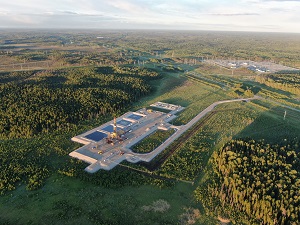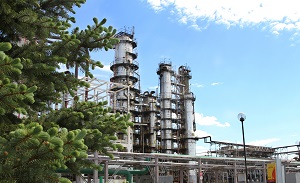Please activate JavaScript in your browser to use all interface options.
Rosneft Improves ESG Indicators
16 September 2021
Ensuring the sustainability of its production activities, Rosneft works continuously to minimise its impact on the environment in order to preserve it for the benefit of current and future generations.
The Company is a member of the UN Global Compact, thus confirming its commitment to the highest principles of sustainable development. Rosneft publishes details of its ESG activities annually in its sustainability reports.
Rosneft is implementing a number of comprehensive programmes for the preservation and restoration of natural resources. According to sustainability reports, Rosneft has reduced its gross emissions by 17% over the past three years, partly through its programme of associated petroleum gas utilisation. In Upstream, the pipeline reliability programme has reduced the level of adverse impact caused by pipeline failures by 17% over three years. Rosneft has reduced its previously accumulated drilling waste by more than 1.3 million tonnes in 2020. Furthermore, several enterprises within the Group achieved 100% remediation of legacy land.
One significant element of the climate agenda is the development of a mechanism for natural carbon sequestration. In this regard, Rosneft sees huge potential for the absorption capacity of Russian forests and places increased emphasis on this initiative. Between 2018 and 2020, Rosneft subsidiaries’ employees planted more than 3.5 million seedlings, with some 4 million seedlings and young trees planted in the first half of 2021.
The Company’s activities involve the use of water resources, so it pays considerable attention to water management. Over the past three years, the volume of wastewater disposal for recycling to other organisations has increased by 22%.
 The Company carries out regular aquatic biological resources reproduction activities to conserve and enhance the fish fauna. In 2020, Rosneft’s subsidiaries released more than 65 million juvenile fishes of Siberian sturgeon, muksun, peled, salmon and other species into Russia’s river systems, with more than 70 million juvenile fishes already released into water bodies in the first half of 2021.
The Company carries out regular aquatic biological resources reproduction activities to conserve and enhance the fish fauna. In 2020, Rosneft’s subsidiaries released more than 65 million juvenile fishes of Siberian sturgeon, muksun, peled, salmon and other species into Russia’s river systems, with more than 70 million juvenile fishes already released into water bodies in the first half of 2021.
Improving safety culture is one of Rosneft’s key priorities. Over the past three years, training in health, safety and the environment has increased by 22%. Despite the restrictions caused by the coronavirus infection, additional measures were taken in 2020 to implement the Golden Rules for Workplace Safety, with more than 130,000 employees undergoing distance training.
To improve management efficiency and minimise the environmental impact of its operations, the Company has invested more than 122 billion roubles in fixed assets since 2018 (programmes to improve the associated petroleum gas utilisation, pipeline reliability, to construct treatment facilities, etc.), with recurrent (operating) costs amounting to 92 billion roubles over this period.
Rosneft has set ambitious long-term goals for the climate agenda. Long-term efforts have been designed to build a systematic approach to achieving those, reflecting the heightened focus on environmental protection at global, regional and local production levels.
In 2020, the Company developed an Environmental Vision, which, along with the 2035 Carbon Management Plan, has become a key component of Rosneft’s long-term environmental agenda, defining the basic principles of its environmental activities.
The Environmental Vision combines three priority areas as follows:
- carbon management,
- biological diversity preservation, and
- environmental protection activities (water and air protection, land remediation, industrial waste management).
Rosneft Oil Company shares and actively supports international and national climate change goals. In 2020, Rosneft was the first Russian oil and gas company to set climate targets through 2035 as part of its Carbon Management Plan. The document stipulates preventing greenhouse gas emissions of 20 million tonnes of CO2-equivalent, reducing the emission intensity in oil and gas production by 30%, and achieving a methane emission intensity below 0.25%.
 The Carbon Management Plan also envisages zero routine flaring of associated petroleum gas. This indicator has already reached the target 95% at some of Rosneft’s subsidiaries, including Samotlorneftegaz, RN-Vankor, RN-Purneftegaz, Kharampurneftegaz, North Chaivo, Bashneft Dobycha, Sorovskneft, etc.
The Carbon Management Plan also envisages zero routine flaring of associated petroleum gas. This indicator has already reached the target 95% at some of Rosneft’s subsidiaries, including Samotlorneftegaz, RN-Vankor, RN-Purneftegaz, Kharampurneftegaz, North Chaivo, Bashneft Dobycha, Sorovskneft, etc.
The Company is developing cooperation in carbon management and sustainability with foreign partners. Rosneft entered into cooperation agreements with BP and Baker Hughes to assess, among other things, the prospects for decarbonisation (the use of CO2 capture, utilisation and storage technologies).
Rosneft is recognised as the leading Russian oil and gas producer in a number of international ESG ratings, including Refinitiv and Bloomberg. Sustainalytics, an international agency, improved the Company’s ranking in its rating twice in April 2021. With a score of 33.9, Rosneft became the best among Russian oil and gas companies.
Rosneft
Information Division
September 16. 2021

-315xx70.png)

